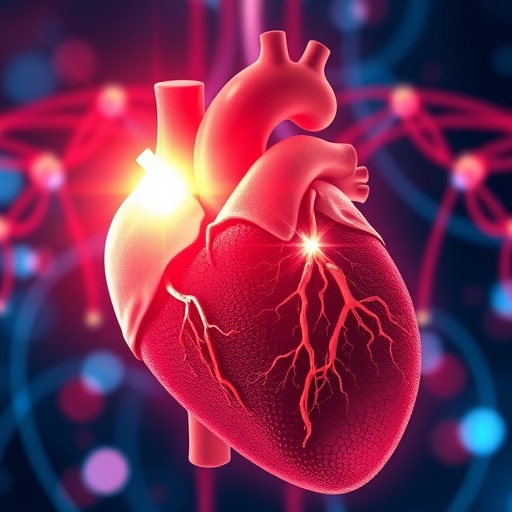In an emerging study, researchers have made significant strides toward unlocking the mysteries of myocardial infarction, commonly known as a heart attack. The findings, led by a team of distinguished scientists including Wu, Wang, and Cui, delve into the intricate interplay between diagnostic marker genes and immune cell infiltration. This groundbreaking research, published in the esteemed journal Biochemical Genetics, not only enhances our understanding of myocardial infarction but also opens new avenues for potential preventive and therapeutic strategies.
Myocardial infarction remains a leading cause of morbidity and mortality worldwide, highlighting the urgent need for effective diagnostic and prognostic tools. With previous studies hinting at the role of genetic factors in heart disease, this latest investigation brings forth a comprehensive bioinformatics approach to identify diagnostic markers that could revolutionize patient management in cardiology. By employing advanced computational tools and methodologies, the research team meticulously analyzed extensive gene expression datasets, aiming to pinpoint specific genes that exhibited strong associations with myocardial infarction.
The team’s bioinformatics workflow integrated multiple layers of data analysis, allowing for a robust evaluation of gene expression profiles related to myocardial infarction. They utilized various public databases and repositories, combining genomics, transcriptomics, and epidemiological data to create a well-rounded perspective on the genetic factors associated with this critical condition. This multi-faceted approach was key in narrowing down potential marker genes that hold diagnostic promise for myocardial infarction.
One of the standout features of this study is its focus on immune cell infiltration within cardiac tissues affected by myocardial infarction. The researchers postulated that understanding the immune landscape surrounding heart tissues could provide vital clues about the underlying pathology of myocardial infarction. Immune cell infiltration is not merely a byproduct of myocardial damage; it plays a fundamental role in tissue repair, inflammation, and ultimately, cardiac remodeling. By analyzing immune cell profiles alongside the marker genes, the researchers uncovered complex interactions that could elucidate the immune response triggered by myocardial infarction.
Highlighting the critical role of immune cells, the study underscores how these cells can influence the progression of heart disease. The identification of specific immune cell types that infiltrate cardiac tissues during a heart attack is tantamount to gaining insights into the disease’s mechanisms. The findings suggest that therapeutic interventions targeting these immune pathways could hold promise for enhancing recovery outcomes in myocardial infarction patients.
The experimental validation segment of the study confirmed the initial bioinformatics findings, bridging the gap between computational analytics and clinical relevance. This validation process involved laboratory-based experiments, where the identified marker genes were examined in biological samples obtained from myocardial infarction patients. This triad of bioinformatics, experimental review, and clinical correlation forms a robust foundation that enhances the credibility of the findings.
Moreover, the research team scrutinized the expression levels of the identified genes, observing how these levels fluctuated pre- and post-myocardial infarction, which allows for the potential of developing a gene-based signature for better accuracy in diagnosing myocardial infarction. Leveraging techniques such as real-time PCR and next-generation sequencing, they ensured that the gene expression data was precise and relevant to real-world clinical scenarios. This methodological rigor was paramount in constructing a reliable framework for future diagnostic tools.
Importantly, this study signifies a shift towards precision medicine in cardiology, where treatment strategies can be tailored based on genetic and immunological profiling. As medical science transitions into an era where personalized care is prioritized, findings from this research could guide clinicians in selecting the most effective therapeutic options based on an individual patient’s genetic make-up and immune response profile.
The potential implications of these findings are vast. Beyond improved diagnosis, the identification of specific marker genes and immune cell interactions could lead to the development of novel therapeutic interventions. Strategies aimed at modulating the immune response or enhancing the function of protective immune cells may emerge as viable treatment options to mitigate myocardial infarction-related damage and promote cardiac recovery.
The future trajectory of this research holds promise for uncovering even deeper insights into myocardial infarction, with the potential to investigate additional factors such as environmental influences, lifestyle choices, and comorbid conditions like diabetes or hypertension. By considering these elements, researchers can construct a more holistic model of myocardial infarction, which could culminate in more effective prevention strategies.
As science continues to unfold the mysteries surrounding myocardial infarction, this study provides a pivotal blueprint for future investigations. The nexus of bioinformatics and experimental validation offers a fertile ground for subsequent research, fostering innovation in both diagnostic and therapeutic realms. It is anticipated that further exploration in this area will yield practical applications that can enhance patient care and ultimately save lives.
In conclusion, the groundbreaking work of Wu, Wang, Cui, and their colleagues not only advances our understanding of genetic factors in myocardial infarction but also bridges the gap between fundamental research and clinical application. As the medical community stands on the brink of a transformation in how heart diseases are diagnosed and treated, studies like this lay the groundwork for a new era of informed patient care characterized by personalized and proactive strategies in managing cardiovascular health.
Subject of Research: Myocardial Infarction Diagnostic Marker Genes and Immune Cell Infiltration
Article Title: Bioinformatics and Experimental Validation of Diagnostic Marker Genes for Myocardial Infarction and Analysis of Their Immune Cell Infiltration.
Article References:
Wu, S., Wang, R., Cui, J. et al. Bioinformatics and Experimental Validation of Diagnostic Marker Genes for Myocardial Infarction and Analysis of Their Immune Cell Infiltration. Biochem Genet (2025). https://doi.org/10.1007/s10528-025-11211-2
Image Credits: AI Generated
DOI: 10.1007/s10528-025-11211-2
Keywords: Myocardial Infarction, Diagnostic Marker Genes, Immune Cell Infiltration, Bioinformatics, Gene Expression, Precision Medicine, Cardiovascular Health




